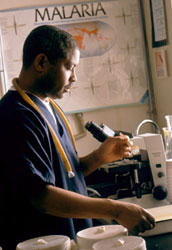NIH malaria research benefits from Fogarty training programs
May 16, 2017
Fogarty has funded or administered nearly 900 grants that were either entirely focused on malaria research training or included a malaria component. Fogarty grantees, scholars and fellows have also, among other projects, conducted malaria vaccine research, studied the impact of poor-quality malaria drugs on resistance, looked at malaria transmission patterns, and observed gene mutations that make mosquitoes resistant to insecticides.

Photo courtesy of NIAID
The principal investigators at six of the seven International Centers of Excellence for Malaria Research (ICEMR) awarded $9 million in funding in April by the National Institute of Allergy and Infectious Diseases (NIAID) have Fogarty Global Infectious Disease Research Training Program, or GID, awards. Research centers in 17 countries where malaria is endemic, in Africa, Asia, the Pacific Islands and Latin America, are funded by ICEMR awards.
GID, like all of Fogarty’s programs, recognizes that people are the most important asset of any country or company or organization. Through training programs set up to meet a country’s needs, GID provides researchers and support staff at institutions in malaria-endemic countries with the tools and knowledge they need to conduct infectious disease research independently. Long-term training provided by GID allows scientists from low-resource countries to complete master’s and doctoral degrees, while short- and medium-term courses and workshops focus on improving expertise and skills.
The malaria-focused GIDs offer workshops and short courses in disciplines ranging from the ecological and molecular epidemiology of malaria, population genetics, genomics of vector insecticide resistance and malaria parasite drug resistance, the development of new malaria vector surveillance and control tools, laboratory-based molecular biology, bioinformatics and field-based ecological research, biostatistics and data management, modeling, scientific writing and the responsible conduct of research.
Principal investigators at these ICEMRs have Fogarty-funded GIDs:
ICEMR: Amazonian Center of Excellence in Malaria Research (Peru)
Principal Investigator: Joseph Vinetz, M.D.
Lead Institution: University of California, San Diego
GID: Translational Research Development for Endemic Infectious Diseases of Amazonia
Aims to build laboratory- and field-based research capacity in Peru. Training is conducted mainly in-country with a small number of candidates undergoing short- or long-term training not available in Peru at the University of California (San Diego and Davis).
ICEMR: Multidisciplinary Research for Malaria Control and Prevention in West Africa
Principal Investigator: Seydou Doumbia, M.D., Ph. D.
Lead Institution: University of Sciences, Techniques and Technologies of Bamako, Bamako, Mali
GID: Training program on operational and health services research for malaria in Mali
Supports students doing 2-year MPH at University of Bamako, runs short course on malaria prevention and control, supports Ph.D. students, allows Malians to spend a term each year at Johns Hopkins Bloomberg School of Public Health to take courses not offered in Bamako. (Note: Years of collaboration with Fogarty and NIH have been cited as a key reason why the death toll from Ebola in Mali was low after the disease spread there from neighboring Guinea. Six people died in Mali, 2,543 in Guinea.)
ICEMR: Program for Resistance, Immunology, Surveillance and Modeling of Malaria in Uganda (PRISM)
Principal Investigator: Grant Dorsey, M.D.
Lead Institution: University of California, San Francisco
GID (co-PI): Training in malaria research in Uganda
The program has trained about 50 Ugandan junior scientists in malaria research, mostly at the master’s level, 13 of these trainees have so far advanced to PhD training, and the more senior trainees are advancing to academic positions in Uganda. The trainees have authored about 250 papers during or after their training, with 61 first-author papers to date.
CEMR: Environmental Modifications in sub-Saharan Africa: Changing Epidemiology, Transmission and Pathogenesis of Plasmodium falciparum and P. vivax Malaria
Principal Investigator: Guiyun Yan, Ph.D.
Lead Institution: University of California, Irvine
GID: Population biology of African malaria vectors and parasites
Aims to advance the career development of promising young scientists from sub-Saharan African countries and help them address challenges in malaria vector control in their regions. Postdoctoral fellows and Ph.D. students from Africa will gain research experience in laboratory-based molecular biology, bioinformatics and field-based ecological research, and attend core training in biostatistics and data management, bioinformatics, modeling, scientific writing and responsible conduct of research.
Southeast Asia Malaria Research Center
Principal Investigator: Liwang Cui, Ph.D.
Lead Institution: Pennsylvania State University, University Park
GID: Enhancing vivax malaria research in Thailand
Goal is to train junior scientists in the Greater Mekong subregion of Southeast Asia to address problems in vivax malaria research. A collaboration between Pennsylvania State University and Mahidol University in Thailand, this GID has been extended to Myanmar - the country with the heaviest malaria burden in the region. Program will provide long-term training to junior faculty members, postdoctoral fellows, Ph.D. students, and offer yearly short courses and workshops for scientists in the subregion.
Myanmar Regional Center of Excellence for Malaria Research
Principal Investigators: Christopher Plowe, M.D., M.P.H., Myaing Myaing Nyunt, M.D., M.P.H., Ph.D.
Lead Institution: University of Maryland School of Medicine, Baltimore
GID (in Mali, not Burma): Malaria research training in Mali
Goal is to build sustainable research capacity at the Malaria Research and Training Center in Mali.
More Information
To view Adobe PDF files,
download current, free accessible plug-ins from Adobe's website.